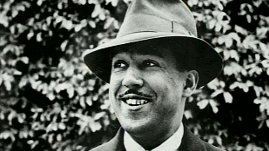Teachers' Domain - Digital Media for the Classroom and Professional Development
User: Preview

Source: A Walk Through Harlem


Funding for the VITAL/Ready to Teach collection was secured through the United States Department of Education under the Ready to Teach Program.
This segment from A Walk Through Harlem presents the poem, "The Negro Speaks of Rivers,” written by Langston Hughes in 1922 when he was eighteen years old. Born in Joplin, Missouri, Hughes traveled to New York City in the 1920s to become a part of an exciting arts and culture movement called the Harlem Renaissance. He later became known as the "poet laureate of Harlem." Hughes was one of the first African American writers who wrote stories about the authentic experiences of his people reflecting their pain, suffering, humor, creativity, and joy. He often was inspired by music and incorporated it into his poetry. Hughes made substantial artistic contributions to the Harlem Renaissance and holds an important place in American literature.
American history, African American history, literature, Harlem Renaissance, poets
The following Frame, Focus and Follow-up suggestions are best suited for middle school students using this video in an English language arts or social studies lesson. Be sure to modify the questions to meet your students' instructional needs.
What is Frame, Focus and Follow-up?
Frame (ELA) What is imagery? How would you determine the theme of a poem?
Focus (ELA) Listen to the reading of “The Negro Speaks of Rivers.” As you listen, think about the imagery. Do the descriptions in the poem translate into meaning for you? What do you think is the theme?
Follow Up (ELA) Discuss Hughes' message or theme. Does hearing the poem help you better understand the history of people of African descent?
Frame (SS) What do you know about the period of time in which Langston Hughes began writing? Why is Langston Hughes considered an important American poet?
Focus (SS) Describe the attitude of the speaker in the poem. Do you think Langston Hughes is the speaker? How is the attitude of the speaker indicative of the period in which the poem was written?
Follow Up (SS) “The Negro Speak of Rivers” is a poem most closely associated with the Harlem Rennaissance period. What might be the historical significance of the poem being created during this time? Describe this period in America. Describe this period for African Americans. What experiences of White Americans and of African Americans are the same or different during this period?
Professor Kate Rushin: I've known rivers. I've known rivers ancient as the world and older than the flow of human blood in human veins. My soul has grown deep like the rivers, I've bathed in the Euphrates when dawns were young, I built my hut near the Congo and it lulled me to sleep. I looked upon the Nile and raise the pyramid above it. I heard the singing of the Mississippi when Abe Lincoln went down to New Orleans. And I've seen its mighty bosom turn all golden in the sun set. I've known rivers. Ancient dusky rivers. My soul has grown deep like the rivers.
 Loading Standards
Loading Standards